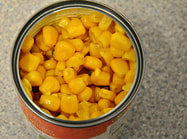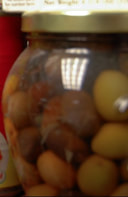
So over the years consumers have become aware of the health risks that BPA can present, especially to fetuses, infants and young children. Some Health officials are concerned about the role that BPA may have in childhood brain development and behavior problems. Additionally, some studies on animals have shown a possible link between BPA exposure and an increased risk of cancer later in life. Complete evaluation of this data shows tests done on animals, not humankind. Nevertheless, the Center for Science in the Public Interest (CSPI) had CSPI's nutritionist David Schardt stated: "We don't want to tell people not to eat canned beans or tomatoes, but at the same time, it makes sense for all parents, and especially pregnant and nursing women, to minimize the exposure of their kids' developing bodies and brains to BPA."
 Glass Jar of Olives
Glass Jar of Olives Try to buy items such as Tuna, in glass jars and do the same with olives. Change over your plastic food storage containers to glass within your own budget of time and money. If you are unable to do so, then just wrap the left-over food in wax paper before placing in a plastic container. Wax paper, Glass and Porcelain do not leach toxins into our food. Avoid tomatoes or sauces in cans since they are highly acidic and aid in the leaching process of BPAs into the food. Just remember that most aluminum cans are lined with BPA and so are shiny thermal receipts from some gas station machines, ATMs, lottery or airline tickets, prescription labels, and cash registers.
Some additional information to keep in mind is that the Polycarbonate plastic with a recycling number "7" contains BPA and BPAF, which some studies claim to be worst. Also do not recycle receipts that might contain BPA and do not use a hand sanitizer after holding a receipt in question, because some reports showed that the absorption of BPA is increased with the use of hand sanitizer. Just use good old soap and water.
Now the complete evaluation of this data presents no evidence that we should have a panic attack because, once in a while, we had a tuna sandwich made at a diner that used tuna from a can. However, a serious effort should be made to avoid BPAs when expecting a child or feeding young children. A reasonable effort should be made for adults. In a short period of time, we will see safer food packaging across the market place as a steadfast transition takes hold.
Bill Lauto, at GoingTrueGreen.com
Environmental Scientist
International Sustainability and Energy Consultant
Contribute your comments!






















